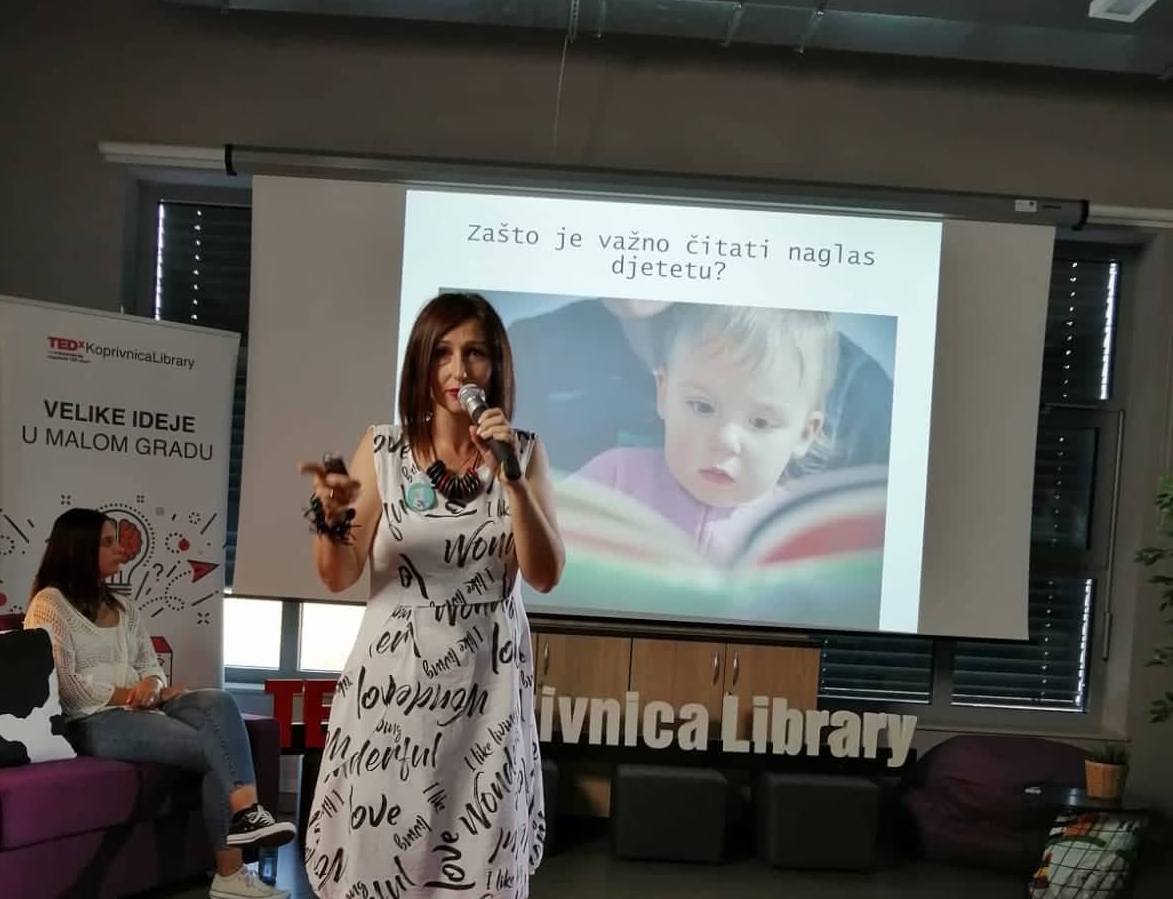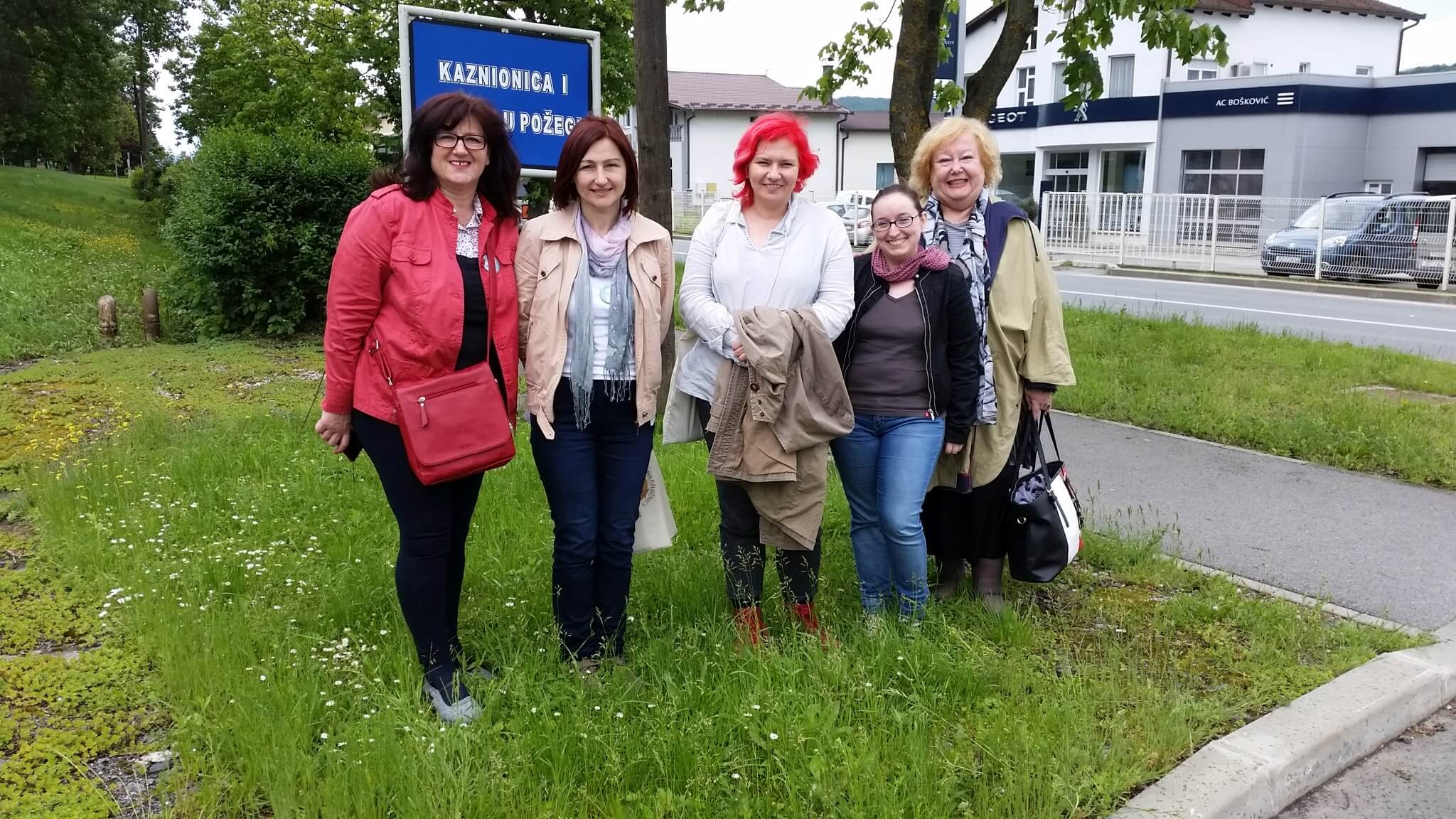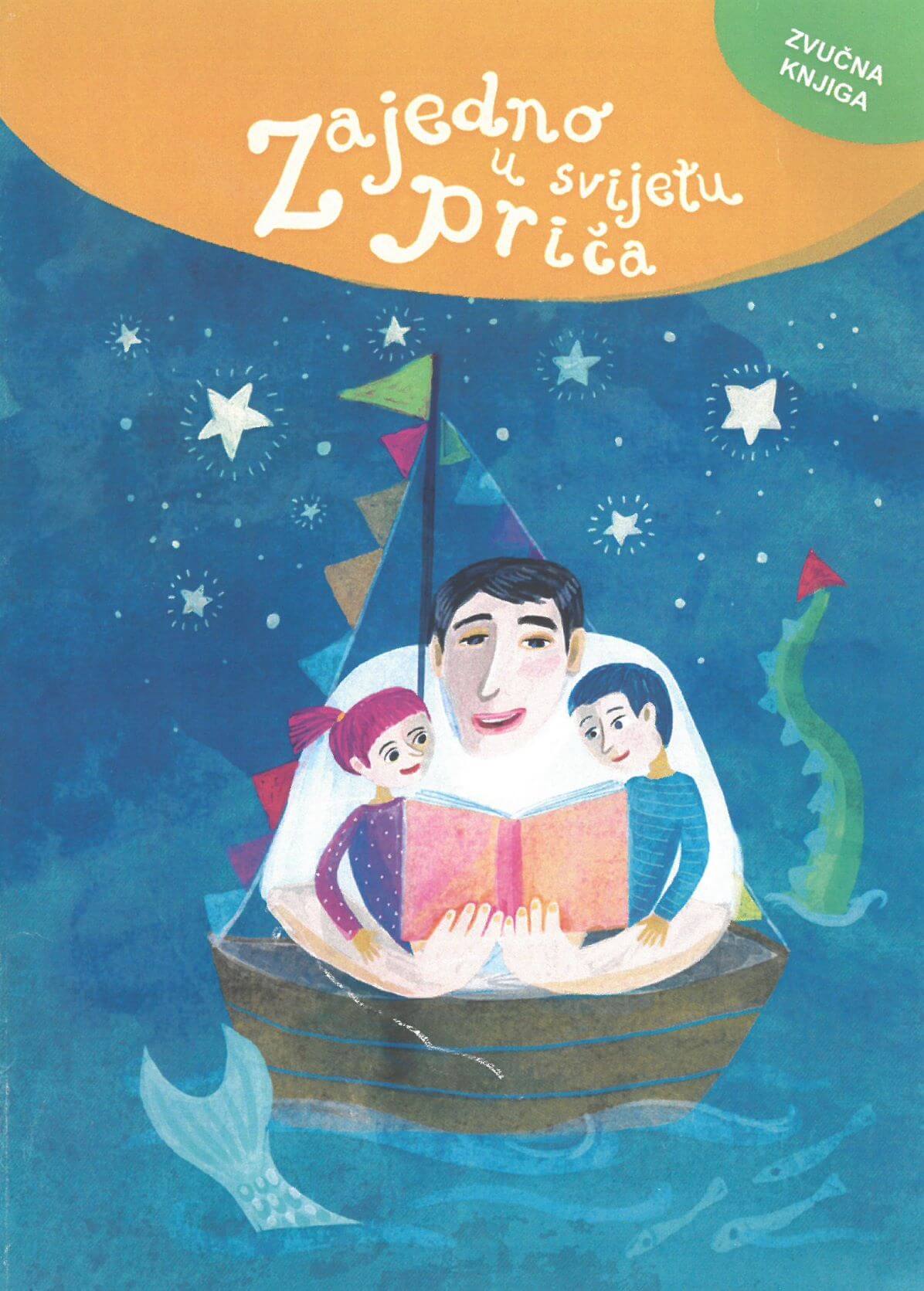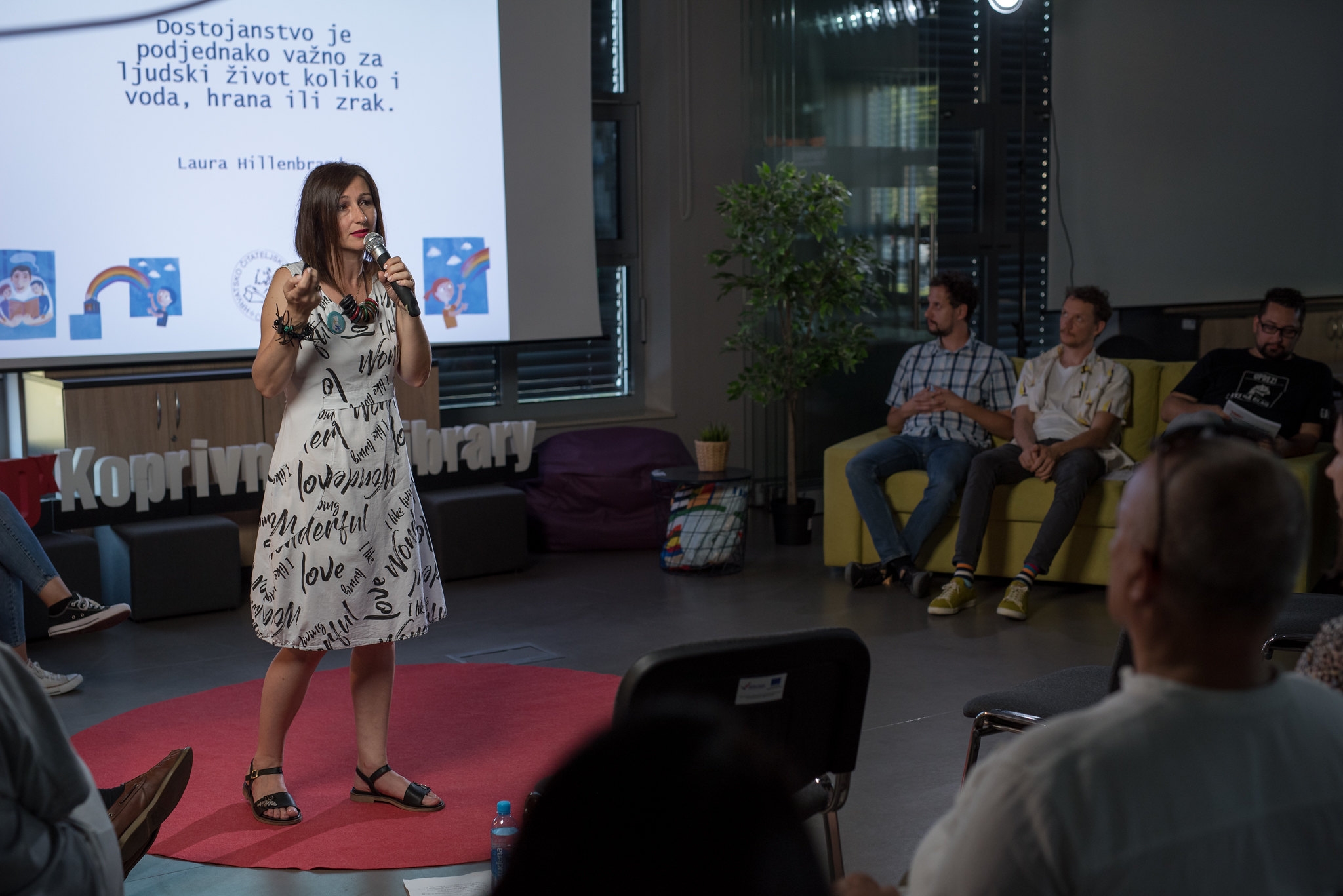10th Book Night to Symbolically Mark Start of Year of Reading Activities
ZAGREB, 19 April, 2021 - The Croatian Culture and Media Ministry on Monday announced the 10th Book Night, to be held on Friday, 23 April, as one of the activities planned for this year, which has been declared a Year of Reading.
Culture and Media Minister Nina Obuljen Koržinek said at a news conference that dedicating the year 2021 to reading was part of the national strategy promoting reading, which had gained special importance in the context of the coronavirus pandemic, when organising cultural events involving a large number of participants had become impossible.
It was therefore only natural to dedicate this year to reading, "an activity that we associate with our intimate space, that does not jeopardise anyone and that enriches everyone involved in it," she said.
The minister said that the results of a project on the role of reading in building an inclusive society, for which funding was secured from the European Social Fund, would be published soon, as well as that funds that would not be mobilised due to a ban on international fairs would be redirected to promote domestic cultural activities.
Obuljen Koržinek expressed confidence those activities would result in better indicators regarding books and reading and that trends on reading habits, which have been stagnating for a long time, would change for the better.
Maja Zrnčić of the Culture and Media Ministry spoke about programmes to take place in the Year of Reading.
She said an important goal of the event was to make existing programmes - awards, festivals, fairs and other book events - more visible, as well as promote new programmes, including the project "Born to read", which promotes a love of reading from early years onwards and as part of which free picture books will be distributed to pediatric offices across the country to be passed on to parents.
The ministry also intends to improve the status of authors and translators and make them more visible.
Another event, which is part of the national strategy promoting reading, is National Day of Reading, when Croatians will be reading at the same time at different places.
In October, an international conference on ways to promote reading will be held.
There is also a plan to declare public figures, such as actors, athletes, doctors and the like, ambassadors of reading.
Local and regional government units have been asked to enable free library membership for all young people this year, Zrnčić said while speaking about the activities planned for this year to promote reading.
Year 2021 Declared Year of Reading in Croatia
ZAGREB, Dec 30, 2020 - The year 2021 will be a Year of Reading in Croatia, the government decided on Wednesday, which means that a series of activities will be conducted to promote the culture of reading and enable as many people as possible to read with understanding and enjoy it.
The slogan will be "Let us read not to be left without words."
The declaration of the Year of Reading is part of a measure from the action plan of the National Strategy to Revive Book Reading, adopted in 2017 to contribute to the development of the culture of reading.
Culture and Media Minister Nina Obuljen Korzinek said that the decision to declare next year the Year of Reading had been made, among other things, due to the coronavirus pandemic and the fact that reading was one of the cultural activities we turn to in such circumstances.
During the Year of Reading, new activities will be created and carried out -- the award for the best bookstore will be presented, there will be a competition for the best book trailer for primary and secondary school students, "reading ambassadors" will be proclaimed, an international reading conference will be organized, youth award for literature will be presented, little night readings will take place -- all of which will contribute to the affirmation of reading.
"Last week, a European Social Fund tender worth HRK 41 million was launched, and all funds will be additionally invested in programs promoting reading," the minister added.
The decision underscores the importance of reading since models of identification found in literature offer opportunities for a more successful understanding of interpersonal communication, better conflict resolution, and a fuller understanding of what helps or threatens us in life.
Inmates Can Read to Their Children Thanks to RODA, HČD and Kristina Čunović
July 30, 2020 - Sociologist Kristina Čunović made inmates' dreams come true - those who didn't even know they existed. Thanks to the RODA, The Croatian Reading Association and Čunović, inmates now have a special connection with their children through reading.
Inmates are, without any doubt, a marginalized group of society. But that doesn't mean they stopped being parents at the moment they entered prison. Kristina Čunović, sociologist and senior librarian advisor, let this thought lead her on her mission.
In the Republic of Croatia, about 12,500 children a year have one or both parents in prison. These children are invisible to the community, vulnerable, almost all are indirect victims of their parents' actions. Most people will be horrified when they hear this information but will do nothing about it. “But activists, human rights activists have a ‘life impulse’ to initiate change in problem areas; they cannot sleep peacefully, and they need to change the world for the better. I am among those activists myself. I was only able to connect the children and parents of the inmates from the area where I work, about which I know, and that is to encourage reading and literacy,” said Kristina.

The reading program includes the following: inmates receive picture books and books adapted to the age of the children. The books are selected by experts from The Croatian Reading Association. Inmates choose a book, read the story to their child, and prison staff help to record the story and send the recording to the child. Thus the child has the opportunity to listen to his mother or father whenever he wants to.
By listening to a recording and flipping through a book or picture book, the child develops listening skills, imagination, attention retention exercises, and enriches vocabulary. At least as important is connecting parents and children through moments of reading and listening to stories, despite the barriers that divide them.
“In the intimate and magical moment of sharing a beautiful story, through the ‘sound book’ they receive from their parents, the child gets the opportunity to have the parent prisoner with them, and the parent - to give the child a part of themselves,” said Kristina.
This program supports the national campaign to encourage children to read aloud, "Read to me!", which she initiated seven years ago.
The project was first started by members of the association RODA (Parents in Action) with mothers in prison. In Croatia, not all inmates are in the same position concerning the possibility of visiting family members. Although it is recommended that inmates with families be placed in prisons closest to their children's residence, female inmates are at a much more significant disadvantage than males. Women sentenced to more than six months in prison can serve their sentences only in the Požega Penitentiary. Given its geographical location, poor transport links, and the socioeconomic status of these families, their children are usually unable to visit regularly. Maintaining these relationships between the parent who is in prison and the child is necessary for a balanced upbringing and overcoming the child's developmental crises. The key question was how to connect the parents of the inmates and their children. The reading program developed with mothers at the Požega Penitentiary has been recognized as a quality model that has been extended to fathers, thus strengthening their parental role.

Reading programs that connect inmates and their children in the world exist, but Croatian is special because it is implemented in all penitentiaries and prisons in the Republic of Croatia (2015-2019). It received continuous financial support from ministries (up to 2019), and children's librarians prepared a recommended list of quality children's books. The program was also recognized by the international professional community as special and received the Award for Innovative Promotion of Reading in Europe for 2017, awarded by the world's largest organization for the promotion of literacy ILA - International Literacy Association.
Until 2014, there was almost no support program for parents of inmates and their children. Members of the RODA association and their executive director Ivana Zanza were the first to start the program with their mothers. Then later, members of The Croatian Reading Association joined the program with their fathers - Kristina as the president of CroRA from 2014 to 2016, mag. bibl. Snježana Berak as vice-president of CroRA (current president) and mr. sc. Ljiljana Sabljak, bibliotherapist.
Since 2016, RODA, in partnership with The Croatian Reading Association, has been developing a reading program in three penitentiaries - Penitentiary and Prison in Požega, Penitentiaries in Glina and Lepoglava (with funds from the Ministry of Social Policy and Youth), and at the end of 2016 in Zagreb Prison (funds of the City of Zagreb). By the end of 2019, the program took place in all prisons in Croatia (funded by the Ministry of Justice). “We were surprised by such a large turnout of parents, especially those who have difficulty reading, but we encouraged them to retell the picture book to their child,” said Kristina. About 2,400 books with appropriate envelopes, CDs, and postage stamps were available to inmates in the program. Everything in this program for inmates was free, and about 600 inmates participated, some even sending their footage and book to a child a couple of times.

"It would be dishonest to say that we did not encounter any minor obstacles and that all the principals reluctantly accepted the reading program. However, all obstacles have been addressed by the Ministry of Justice by building links between civil society organizations and the prison system, and we are grateful to them for that," said Kristina. Over time, all principals have realized that the reading program has a preventive role toward inmates who are parents. A prisoner who has managed to maintain (or develop) a close relationship with a child while serving a prison sentence is at a lower risk of recidivism after release. Also, the program has a preventive role towards the child, the end-user of the program: children who are in close and quality contact with a prisoner parent are at lower risk of developing undesirable behaviors, are less stressed due to parental separation and imprisonment, and parent reading and listening to the development of his reading skills, and helps them to later succeed during their schooling. Thus, the reading program contributes to the rehabilitation of the whole family. It has a very positive effect on the behavior of inmates. The program strengthens parental competencies and develops positive parenting of both the inmate parent and their family, especially the positive father's role.
Some inmates initially refused to participate. That changed quickly thanks to the positive comments of other inmates who got involved, but also thanks to the great engagement of the prison staff. Namely, some inmates recorded the reading three or more times (until they were completely satisfied), and the prison staff had patience. A quiet corner in prisons is hard to find; reading is disturbed by noise, a bell, but neither the staff nor the inmates did not give up (as they pointed out).
“They gave me the most valuable thing: even in prison, you can be a man and a father.” (c. father, a prisoner from the Glina Penitentiary)
Father inmates who participated in the reading program are extremely satisfied, and this fact is confirmed by the high percentage of assessment of the probability of re-participation (94% of fathers) and willingness to buy books at their expense (91% of fathers). Almost all fathers also provided supportive feedback regarding positive changes in their relationship with their children. Some inmates did not have any contact with the children, so after sending the picture book and CD, their (ex) partners reacted very well, and now the inmates have telephone contact with the children once a week.

Parents chose the books carefully, prepared in detail for filming, and asked prison staff to record them as soon as possible. Inside the CD/DVD cover, space has been prepared for the father's message to the child, written in his handwriting. Dad can also write messages on the cover of a book/picture book. The family letter encourages them to see if the dad has written the message and to show it to the child. "Upon receiving feedback, the inmates immediately came to the prison staff to inform them and convey the positive reactions of the children and other family members," said Kristina.
Prison staff points out that the inmates involved in this program are much more open in revealing their emotions, bringing them poetry and stories they write about their families. In their opinion, this is solely the result of this program. They are much more eloquent. Almost all were interested in the further implementation of the program, the possibility of procuring new books and educational materials, and some inmates interested in other parenting programs in the prison.
“One father told us that he sent his teenage girl a picture book for babies because there was no choice of books for teenagers in prison. But his daughter's reaction was great; she was delighted with dad's reading, and she didn't know that ‘dad read so well’. She also played a CD with a recording of dad's voice to her friends. It is wonderful to hear that children without fear can talk to friends about their experience of visiting a parent in prison and believe that they will not be stigmatized or ridiculed by other children or adults. We believe that our reading program also helped empower the children and parents of the inmates,” said Kristina.
Her main message on TEDx talk was that we could all include our potentials and knowledge to solve some problems in Croatian society and develop our community in a more humane direction. “But raising citizens' awareness and sensitizing to some social issues and focusing on the right solutions is a slow process; one should be prepared that things will not change overnight and that sometimes changes take years, but one should not give up,” Kristina said.
It was not clear to some friends and colleagues why it was important for her to participate in a reading program for inmates and their children. They even advise her to give up. “The point is that by serving their sentences, inmates did not stop being parents, did not lose the right to make decisions important to their child's care, nor did their relationship with the child become less important. In working with inmates, I primarily viewed them as parents who wanted to stay connected to their children through reading. After reading the touching evaluations of the families who participated in the reading program, there was no doubt that I was doing a good thing for the inmates, their families, and the prison system,” said Kristina.
Inmates who maintain contact with their families while serving their sentences find it easier to accept life in prison and life in the outside world after serving their sentences. Kristina ended her TEDx speech with a saying from a writer who says that dignity is as important to human life as water, food, or air. “My answer is always that by participating in this program, I want to contribute to the inmates and their families to be dignifiedly connected through reading activities. Also, through the book, children enjoy the world of imagination and daydreaming with a story-mediated meeting with a parent.”
Mediterranean Festival of Books to Offer More Than 10,000 Titles
As Morski writes on the 15th of April, 2019, the Mediterranean Festival of Books, a book fair with a sales and festival nature will be organised by the Association of Publishers and Bookstores of the Croatian Chamber of Commerce (HGK) and under the auspices of the Ministry of Culture, Split-Dalmatia County and the City of Split, will be held from the 8th to the 12th of May, 2019.
A record 100 exhibitors will be offering discounted books with up to seventy percent off, with around 10,000 titles to choose from.
As always, entrance is free and during the five days of the festival, you will be able to see the latest publications covering a space of more than two thousand square metres in the large hall of ŠC (Arena) Gripe, and there are also three other stages where the Mediterranean Festival of Books program will take place.
In addition to the well-known Bookvarij and Mali Bookvarij locations where children's workshops, panel discussions and a professional program will be held, the evening part of this event related to all things books will also be located at the "Cukarin" hospitality facility in Gripe.
Fifty program activities have been prepared, and the expectation is for as many as 35 promotions of the latest works of some award-winning and acclaimed authors to take place.
Among other things, this year's Mediterranean Festival of Books program will include panels consisting of prominent lecturers who will talk about important local topics, and there will of course be a multitude of workshops for the youngest among the festival's visitors on offer. Numerous promotions for new children's editions are also being planned.
All information and a detailed oveview of the Mediterranean Festival of Books 2019 program with its workshop schedule is available here, as well as having been published on the event's official Facebook page and on Instagram.
The Mediterranean Book Festival is being organised with the support of numerous partners such as the Split Tourist Board, Split University, Split Student Centre, the Split Sports Facilities public institution, Hotel Zagreb - Split, Cukarin Gripe, Slobodna Dalmacija, Europlakat, Mandis, CineStar, Barcaffè, CedevitaGo, and Kala.
Make sure to follow our dedicated lifestyle page for much more.
'Magical Book Hunt': Free Books in Rijeka, Split and Sisak!
Care for a free book? Follow the hints and get yourself a novel!
Beach Library Opening at Koralj in Krk!
Following Ugljan's example, another Croatian island introduces a beach library
Put Your Phone Away and Grab a Book: Beach Libraries Opening on Ugljan Island
Even though the primary purpose of a vacation is to relax and forget about your usual daily routine, we still hold on to our smartphones in bars and on beaches. We like to keep tabs on what other people are doing on their holidays, we check our e-mails... it's hard to force yourself to get off the grid these days.
Here's an idea: how about you start small? Put your phone on airplane mode for an hour or two and relax with a book. Small paperbacks in multiple languages are available in all bookstores and on most newsstands in Croatia, and if you're more the digital type, an e-reader won't take up a lot of space in your beach bag. If by any chance you end up on Ugljan island this summer, even better: from July 15 to September 15, everyone who visits Kali town on Ugljan will have a chance to check-out books for free from the first beach library in Croatia.
The Public Library Kali came up with a wonderful project a couple of months ago. Called 'Sve (knjige) ćeš na siki nuajti' (local dialect for 'you'll find all the books on the reef'), the beach libraries are devised as three wooden structures shaped like lifeguard towers that will be installed on the beaches of Batalaža, Mul and Luka. Shelves packed with books will be within the reach of all beach-goers free of charge, and will be available to check out between 8 AM and 8 PM.
Local librarian Marta Kolega said she hopes both Kali residents and tourists will like the project. Little beach libraries will be filled with summer literature, mostly crime and romance novels, books for children, but you'll also find an occasional classic if you're the type that likes to enjoy something more serious even on vacation.
"Apart from enjoying the written word, the project aims to prolong the lives of books, as all the novels we plan to offer in small beach libraries, and there are 320, were written off from the Public Library Kali, meaning they were headed for the waste paper bins. We decided to give them new lives", explained Kolega. As the books were written of from the library fund anyway, the new users will have the options to put the book back on the shelf, keep it if they particularly liked it, or pass it on to friends, relatives and loved ones.
Kali is known as the only town with a library on Ugljan island, while the other inhabited places are visited twice a month by a bibliobus coming from the Zadar City Library.
The beach library project proposal was applied to the donation contest Kajo Dadić called 'Our Contribution to the Community', and had Jakov Kolega doing the 3D model of the library in its planned environment. Sadly, the project wasn't adopted as part of the contest, but the young book enthusiasts on Kali couldn't be discouraged that easily. They're the living proof it only takes a bit of courage and a lot of good will to make a great idea come to life!
Beach libraries are already a well-known concept world-wide. The popular beach La Romaniquette near Marseille in southern France is known for a library that has three sheltered spots for reading, and a beach at the Albena resort on the coast of Black Sea in Bulgaria has a beach library with 6000 books in 15 languages.
Congratulations to the team from Kali – here's hoping the concept spreads all over the coast by next year!
Source: Morski.hr


